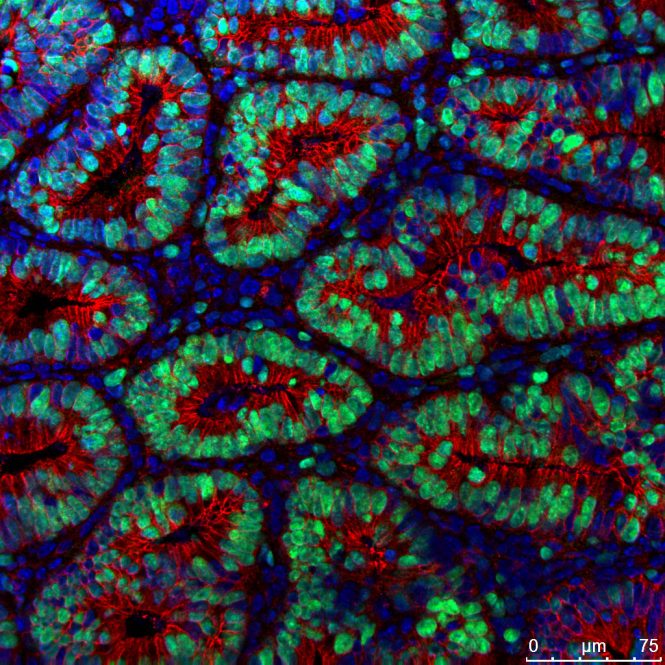Kepeng Wang, assistant professor of immunology at UConn Health, is investigating the complex relationship between cytokines and colorectal cancer.
Wang’s work is supported by a $1.8 million grant from the National Cancer Institute.
Cytokines are a category of proteins secreted by cells. They have an important role in cell signaling. IL-17 cytokines, one family of cytokines, promote inflammation which drives the growth of tumors on the colon. This often leads to colorectal cancer.
To date, the underlying mechanism explaining IL-17’s connection with colorectal cancer relies on its role in helping the tumor recruit myeloid cells, which come from bone marrow. This provides the tumor with a powerful ally to help it grow and spread throughout the body.
What scientists do not yet fully understand is if IL-17 also signals regulatory T cells (Tregs). Tregs are often recruited to tumors and hinder the body’s natural ability to impede tumor growth.
Wang’s preliminary studies show that removing IL-17 signaling on Treg cells increased colonic tumor development in mice. This demonstrated a previously unknown protective role of IL-17 in colorectal cancer, indicating its relationship with tumorigenesis and growth is more complicated than previously thought.
Wang’s team found that IL-17 inhibits Treg accumulation in tumors, a measure that typically indicates a grim prognosis. IL-17 also inhibits the expression of genes that facilitate Treg migration, proliferation, and their ability to suppress the immune system.
Interestingly, Wang’s team only observed these inhibitory effects in tumor-infiltrating Tregs and not in healthy Tregs. This suggests IL-17 engages in site-specific inhibition. Accordingly, only Tregs that infiltrate tumors express the receptors IL-17 cytokines attach to in order to initiate this cascade.
When Wang stimulated Tregs with two cytokines that are abundant in the tumor environment, it led to increased production of the IL-17 receptor. This suggests when Tregs are recruited to tumors, the tumor’s environment makes it more susceptible to being inhibited by IL-17.
Conversely, Wang and his team found that IL-17 signals to tumor cells to reduce the expression of cytokines that signal CD8+ CTL T cells to the tumor. These T cells play an important role in immunity and tumor surveillance. These cytokines are known as CXCL9 and CXCL10.
This means IL-17 inhibits Tregs that would otherwise suppress cancer immunosurveillance while also inhibiting the attraction of T cells that would perform this function. These findings illuminate the complicated role of IL-17 in colorectal cancer and showcase the need for further investigation.
Now, Wang is looking to further his previous work and clarify IL-17’s role in colorectal cancer.
Wang will describe how, exactly, IL-17 mediates the direct inhibition of Tregs in colorectal tumors as well as identify the underlying molecular mechanisms of this process. Wang will then interrogate how IL-17 inhibits T cell attraction through the regulation of CXCL9 and CXCL10.
Ultimately, Wang will test the importance of these interactions and effects in colorectal tumor development and therapies.
“These investigations will provide new insights into the mechanisms by which IL-17 impacts colorectal tumorigenesis, as well as guide the invention and use of novel therapies for the treatment of colorectal,” Wang says.
For example, understanding how IL-17 inhibits CD8+ CTL T cell attraction to tumors could mean adding already available IL-17 antibodies to cancer immunotherapy regimes would improve patient outcomes. While, if a tumor has abundant IL-17 and Tregs, researchers and clinicians could know that using IL-17 antibodies may have an adverse effect for the patient since IL-17 is performing a protective role in this case.
This work can help provide a pathway toward more precise treatments for colorectal cancer patients.
Wang holds a Ph.D. in biochemistry from Hong Kong University of Science and Technology. Wang’s lab focuses on studying the role of inflammation in colorectal cancer development and therapeutic intervention.



